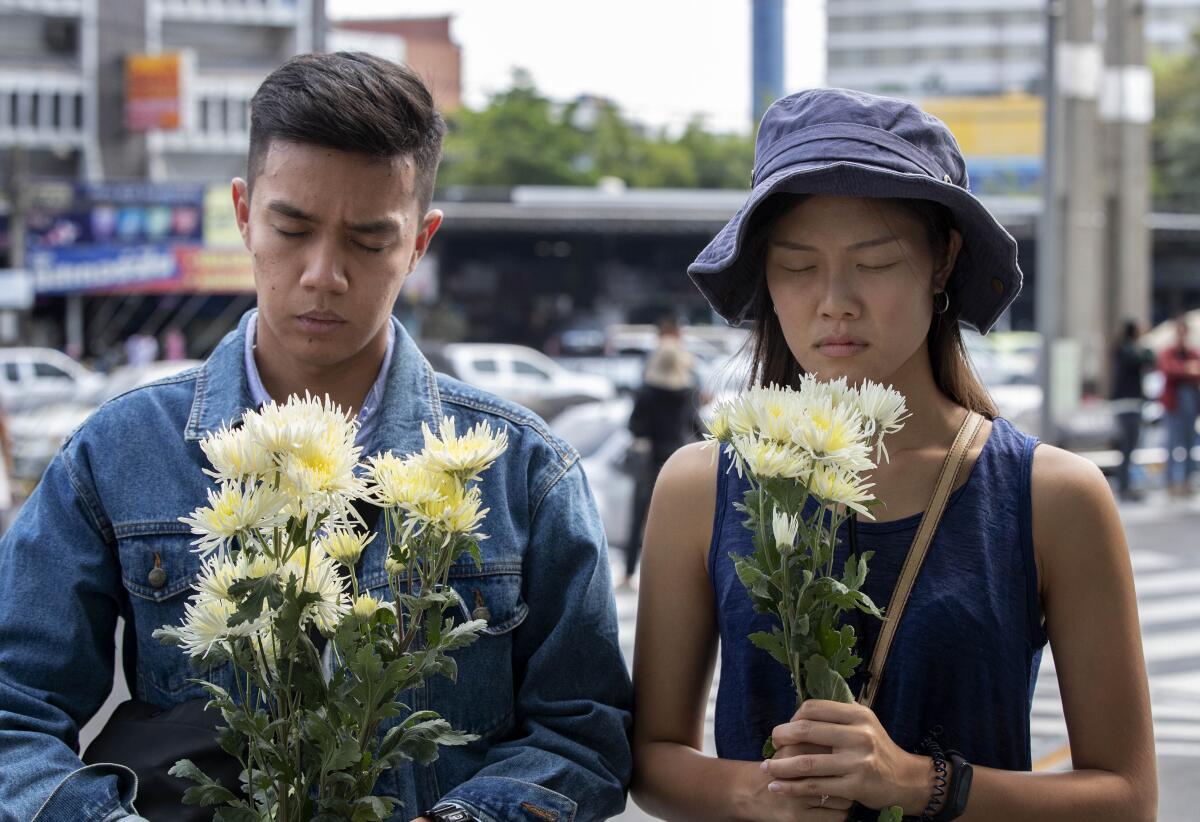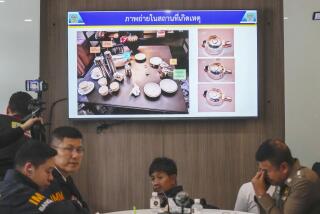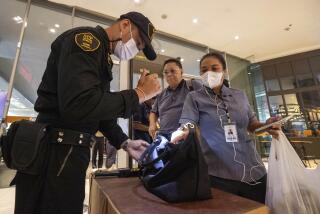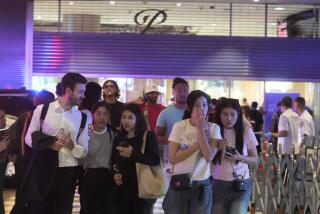City in Thailand copes with aftermath of country’s worst-ever mass shooting

- Share via
NAKHON RATCHASIMA, Thailand — Authorities in northern Thailand began releasing bodies to relatives Monday after security forces cornered and killed a soldier who had carried out the country’s worst mass shooting, an hours-long siege at a shopping mall.
The soldier killed 29 people, starting with his commanding officer, in the stunning tragedy that began Saturday and ended Sunday morning when security forces shot dead the heavily armed attacker in Terminal 21 Korat, an airport-themed mall in Nakhon Ratchasima.
The gunman, Sgt. Maj. Jakrapanth Thomma, 31, was infuriated at a land deal brokered by his commander’s mother-in-law, as far as authorities have been able to determine. She was another of his victims.
The death toll surpassed Thailand’s last major attack on civilians, a 2015 bombing at a shrine in Bangkok that killed 20 people and was allegedly carried out by human traffickers in retaliation for a crackdown on their network.
Messages of sympathy for the latest tragedy were sent by several countries.
The U.S. Embassy said it stood “with the people of Thailand, saddened by tragic events in Nakhon Ratchasima.”
Throughout Monday, people dropped by the Terminal 21 mall to offer flowers and leave notes expressing sympathy.
In the evening, several hundred people gathered outside the mall for a memorial service led by a Buddhist monk and lighted candles to remember the victims.
The night before, more than 1,000 people mourned the victims in another Buddhist ritual at the city’s town square. They lighted candles and chanted.
Thailand’s prime minister said King Maha Vajiralongkorn had offered all of the deceased royally sponsored funeral rites and cremations.
Meanwhile, many of the 58 wounded are still in bad condition, and relatives of the deceased were trying to cope with their losses. The Public Health Ministry sent a mental health crisis team to help the relatives.
Survivors and victims’ families at the city’s hospitals recounted their ordeals.
Cpl. Korakot Ampanngeun said he had been ordered to block a road so no one could go toward the gunman.
“So I was signaling to oncoming traffic when I turned around and saw him. If I had not, I would not have survived,” he recalled. “I tried to run and find somewhere to hide. But I could only take two steps and then I heard the sound — ‘bang.’ My leg just went and I couldn’t walk. A good Samaritan helped carry me away.”
High school student Nachote Chotiklang said he was in his mother’s car as she passed the gunman’s vehicle.
The assailant “got out of the car and fired into the window. At that, I ducked down and didn’t do anything until I felt that car hit something. It hit a tree.”
When the teenager was asked what happened to his mother, Nachote shook his head. Another man explained that she had died.
Rachanon Kanchanamethi was riding a motorbike home when the gunman fired at him. The 13-year-old middle school student was his family’s only child.
His father spoke at the first day of his son’s Buddhist funeral.
“I don’t want to lose him like this,” Nuttawut Kanchanamethi said. “This is too sudden. We had plans for him, growing up. That’s all. We didn’t impose any expectations on him.”
Nuttawut paused for a long moment.
“I want to continue taking care of him, but I no longer have that opportunity,” he said, breaking into sobs.
The bodies of security personnel began to be flown Monday morning to the capital, Bangkok, for funerals.
Nakhon Ratchasima was not prepared for killing on such a scale. The public hospital’s lone forensic doctor was performing autopsies before the bodies were released to families for cremation, but families were told he could only do six per day, so some won’t be able to retrieve their loved ones until Tuesday.
More to Read
Sign up for Essential California
The most important California stories and recommendations in your inbox every morning.
You may occasionally receive promotional content from the Los Angeles Times.










